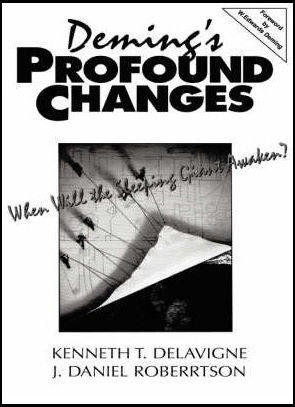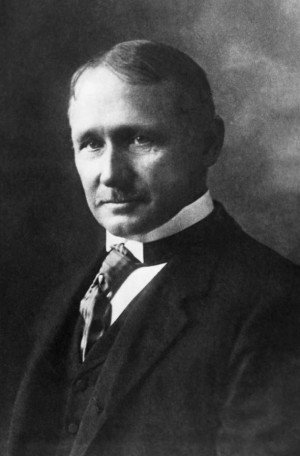 DAN’S SCORE:
DAN’S SCORE: 
Deming’s Profound Changes: When Will the Sleeping Giant Awaken?
by Ken Delavigne and Dan Robertson
I first learned about this book while listening to one of the Deming podcasts interviewing Daniel Robertson.
Though it took me a little while to get into it, this is one of the best books I have read in some time.
The book’s premise is about how our current traditional style of management came to be (i.e. Frederick Taylor’s management theories), why it is damaging business and how accepting Deming’s new management philosophy will help us improve. The authors emphasize Japan is doing so well because they have abandoned Taylorism and adopted Deming’s principles. The authors believe Japan is wondering when America will also make the switch—thus the tag line “When will the sleeping giant awaken?”
I think this quote taken from the book summarizes the intent:
“We will win, and you will lose. You cannot do anything about it because your failure is an internal disease. Your companies are based on Taylor’s principles. Worse, your heads are Taylorized, too.” ~Konosuke Matsuhita, Founder, Matsuhita Electronics (Panasonic), 1988.
My favorite take aways (this was tough to sort out—I tried to shorten this list the best I can, but there is simply a ton of stuff in here):
- Self-managed teams sound Deming-like, but unless they are managed as a system, they will suboptimize and will have a tendency to listen only to the voice of the customer (ex. focusing on specifications) instead of listening to the voice of the process. This sounds very much what scrum teams are trying to do with their focus on customer value. This has certainly made me think.
- Many people don’t understand continuous improvement. Continuous improvement must be in a specific direction guided by purpose or an aim. In order to do this, people need to continuously gain new knowledge and we are not used to doing that.
- There was a study done on what it was the Japanese were doing differently. It was found what they were doing was reducing complexity. I.e they were understanding and then simplifying the system. It was hard to pinpoint what exactly they were simplifying, but whenever they did this, it created positive ripple effects throughout the organization. (Terrifying. It seems every place I work with wants to achieve some objective and if making something complex achieves that aim, so be it. I’m not sure how we break out of this mindset). This whole chapter was fascinating to me.
- The authors list out six dimensions of complexity: number (number of employees, departments, work batches, etc.), volume, density (ex. being geographically spread out), process time (lead or cycle time), variation, and context level (i.e. a manager will understand and see things at a different level than an employee and vice versa).
- Western management focuses on ROI in the beginning, but the Japanese understand that reducing complexity eventually pays returns. (Wow. How do you convince a CFO of that strategy??).
- Management is constantly under scrutiny and pressure from stock holders, creditors, and often the press. All of these folks want RESULTS. This creates a culture obsessed with outcomes and self interest (i.e. they don’t want to lose their power or career) and creates a short-term mindset. The authors note its no wonder managers are constantly making demands on their organizations that exceed their capacity. They force the system to shoulder increased complexity and thus make the system less capable.
- The effects of increased complexity are often subtle and hard to detect in an organization and difficult to trace back to where the issue originated.
- He gave a list of excuses commonly held for the decline in U.S. competitiveness and debunks each one. These include labor issues (such as with Unions), foreign competition and not buying American, lack of automation, trade barriers, government interference, lack of employee motivation, and employee education. The authors state the underlying message with all these issues is that we are managing wrong and we must change.
- The authors suggest that those who are attempting to promote change need to understand the various elements of it. This will help them bring about change and improvement more swiftly. Change will take a great deal of time and effort and there will be many forces, directly and indirectly, opposing it. Fortitude, faith, and courage are essential.
- The authors also discuss why people want to be managers and discuss how we need to be promoting the right people into these positions by looking for certain characteristics. They also discuss how to develop these types of managers.
- They give a strategy on implementing change. They said to break issues into Cosmic (i.e. deep complex issues), low-hanging fruit, and no brainers. They said to go after the low-hanging fruit. I was surprised by this strategy as the Toyota Way goes after the root problem. They said when you solve enough low-hanging fruit and no brainer issues, the Cosmic issues have a tendency to go away.
- They suggest a good way to figure out what to start working on first is to ask the question, “What bugging you?” I started asking this question when I solicit feedback from our customers.
- They suggest we do the following: Be an exemplar, Keep Growing in Knowledge, and Widen Your Personal Orbit of Influence (this last one is what I struggle with).

Frederick Winslow Taylor. The authors premise is the West is stuck in a modern-day form of Tayloristic thinking, a style of management invented over a hundred years ago. Good for its time, but its way past time to evolve.
Though the book explains Taylor’s philosophies, I’m still not sure I understand them despite a whole chapter on it. Of course, I can be dense. I reckon I need to review.
I thought it interesting the authors emphasize Taylor as being the biggest impact on modern management, but they don’t mention the 1841 head-on train collision and the subsequent adoption of military-style organization. This event is cited in two books I’ve read (The Leaders Handbook and The Leaders Guide To Radical Management) and given as the main reason for modern style management.
I thought some of the examples were a little dated, for example the computer industry examples, though pertinent and correct, were stated as something new, but are now near 20 years old. During the podcast interview, Robertson stated he doesn’t think the book needs to be updated because the advice is still the same.
The book can be bought here.
Advertisements Share this:




